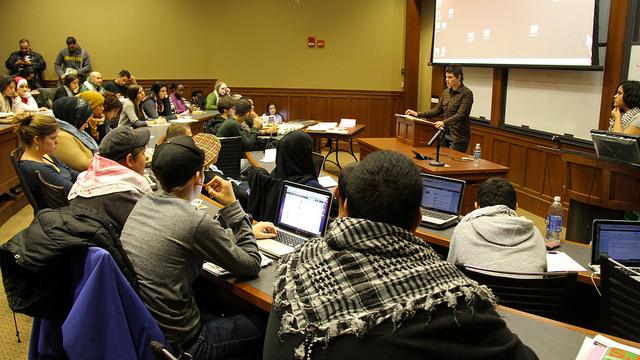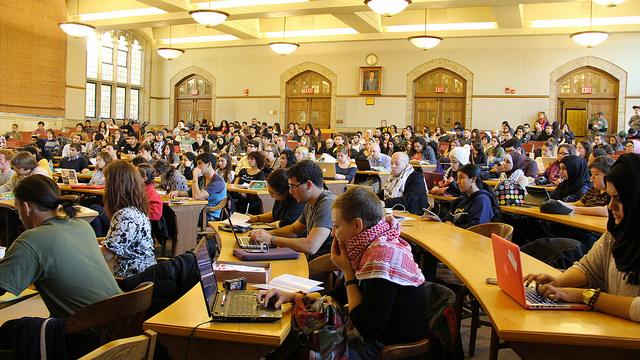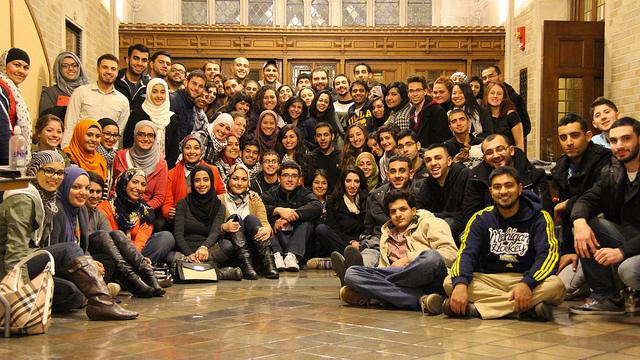Over three hundred student organizers from across the United States converged at the University of Michigan – Ann Arbor over the weekend for the second annual National Students for Justice in Palestine (NSJP) Conference. In addition to reaffirming the call for boycotts, divestment, and sanctions against the State of Israel for its ongoing human rights violations against the Palestinian people, the student organizers passed a number of resolutions making way for effective national structures to assist in coalition-building, media promotion, fundraising, and other key aspects of the national student campaign for justice in Palestine. The conference also reaffirmed NSJP`s position, maintaining that the role of US solidarity activists is to act at the direction of Palestinian civil society. The students further obtained the support of Movimiento Estudiantil Chicano de Aztlán (MEChA), one of the country’s largest Chicano students organizations, who have endorsed BDS and had sent representatives to the conference.
But what was particularly significant about the conference was its pointed opposition to efforts by a handful of non-profit and political organizations that have taken to “normalizing” Israeli injustices. Such normalization efforts call for “dialogue” between Israelis and Palestinians in lieu of political pressure on Israel to respect Palestinian rights. Keynote speaker, human rights law professor, and Jadaliyya co-editor Noura Erakat remarked in her speech at the conference,
Failure to address the project of ethnic cleansing will lead us there. It is not that we can`t fight for a political solution … it`s that that solution should not lose sight of this broader project … and for solidarity, the purpose is not to be complicit in an ethnic cleansing movement, and your role as a rights-based movement does that.
She received a roaring applause and a standing ovation for her statements from the student organizers. Following her, UC Berkeley professor, founding SJP member, and director of American Muslims for Palestine, Hatem Bazian, condemned the “Zionization of the movement” to win Palestinian rights in the “age of the NGO-industrial complex”.
Over the weekend, students learned how to put these words into practice. In one session, student organizers learned how to identify and influence active and potential allies. In a number of workshops throughout the weekend, the organizers were taught how to initiate boycott, divestment, and sanctions (BDS) campaigns against the State of Israel on college campuses, including academic and cultural boycotts of Israeli institutions, and divestment from TIAA-CREF financial services for their investments in corporations complicit in Israeli human rights abuses. Other workshops dealt with building alliances with Palestinian activists in Palestine, building coalitions with other communities in struggle in the United States, and engaging in grassroots lobbying at the local level.

[The scene inside one of the many workshops at the conference. Image by Sara Jawhari via Flickr]
What ties these efforts together is a refusal to collaborate with any attempt to stymie Palestinian rights through the rhetoric of “dialogue” and normalization. Rather than behaving as though the Israeli-Palestinian conflict is one of misunderstanding or cultural problems, student organizers came together recognizing that the injustices of an occupying military power necessitate action – not “dialogue.”
In addition to maintaining an internationally condemned and illegal military occupation of the West Bank, Gaza, and East Jerusalem, and enforcing what South African legal scholars and the international legal community have labeled an “Apartheid regime” against Palestinians, the State of Israel has continued to engage in gross violations of basic human rights law through its broken ceasefires, indiscriminate acts of violence against Palestinian civilians, its full-scale blockade of Gaza, and its refusal to recognize the right of Palestinian refugees to return to their homes. Israel also continues to violate the Geneva Conventions in its ongoing theft of Palestinian land and construction of illegal Israeli settlement-colonies in the West Bank and Jerusalem. Meanwhile, Palestinians remain stateless, largely defenseless, and subject to the partial governance of a “Palestinian Authority” that has remained weak, undemocratic, and complicit in many of these Israeli abuses.
But multiple well-financed political efforts on American college campuses, sometimes voicing limited criticisms of Israeli policy, or eschewing politics all together, seek to whitewash these injustices. Such initiatives suggest that Israel`s war crimes and other abuses can be solved through dialogue and discussion alone, and that activists should hesitate to boycott, divest, sanction, or otherwise advocate decisively against Israel`s abuses. In their view, exiled and besieged Palestinians can only find peace if they negotiate and dialogue with the very state that is holding them under occupation, keeping them in exile, and stealing their land, effectively forfeiting those rights that are being violated in the process.
Students at the NSJP conference, however, have not been impressed with such efforts. Instead, they came together to forge a national campaign that recognizes the imperative of political pressure on Israel as an occupying military power. Erakat mentioned that campus BDS campaigns are now a top threat to Israel`s hegemony in the Middle East according to the American Israel Public Affairs Committee – third only behind a nuclear Iran and the efforts of Venezuelan President Hugo Chavez. The developments at the conference suggest that the threat is only growing. Rather than sacrifice justice and Palestinian rights for a submissive and oppressive order that conflates Palestinian subjugation with “peace,” students recognized that genuine peace requires justice – and justice necessitates action.

[Conference participants during one of the all-conference meetings. Image by Sara Jawhari via Flickr]
The SJP student leaders have answered the call to action by eschewing normalization efforts to whitewash Israel`s abuses, and opting for BDS, grassroots lobbying, and support for non-violent peace activism in Palestine itself. Although normalization efforts remain a well-funded obstacle to the call for justice in Palestine, the growing student movement for Palestinian rights indicates that the farce of “dialogue” over action will not be successful. The ascendance of equal rights for Israelis and Palestinians is on the horizon, with student organizers supporting the movement at the helm.

[Some of the organizers and voluneteers at the NSJP 2012 Conference. Image by Sara Jawhari via Flickr]